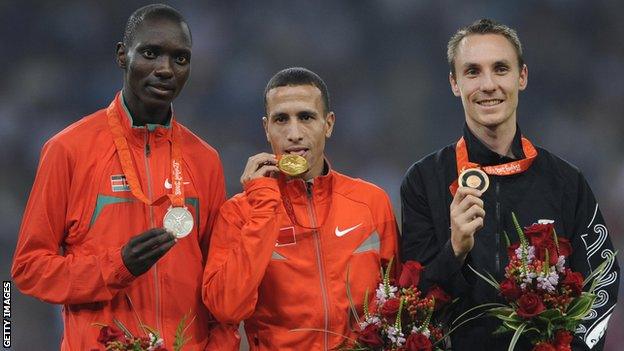Asbel Kiprop says he gave drugs testers money out of 'generosity'
- Published
The truth will come out - Kiprop
Three-time world champion Asbel Kiprop said he paid drugs testers because he "thought they wanted the money for fuel or tea".
Kiprop, who won 1500m gold at the 2008 Olympics in Beijing, tested positive for EPO out of competition in 2017.
The 28-year-old Kenyan alleged his sample "turned positive" because he did not give the testers enough money.
"It is rare for them to ask for money. They didn't specify the amount," Kiprop told BBC Sport.
"To me, I could trust them. It didn't even come into my mind that I was in a sensitive position."
Kiprop also said:
He was visited by the same testers three times that week
He would frequently be asked by testers to go to their houses to give samples
He would always be forewarned he was going to be tested, which is against anti-doping rules
He has since texted the testers to ask why they no longer test him themselves, and has received no reply
He "almost wishes" he had doped so that he could deal with the situation better
He believes dopers should serve a jail term
In May the Athletics Integrity Unit (AIU) rejected claims his sample was tampered with and that testers had asked him for money.
'I could trust them' - what happened?
Kiprop was tested on 27 November 2017 in Iten, Kenya, having been told the previous night that doping control officers would be visiting.
Although that is against protocol, Kiprop said he did not take it as "something serious" because it had happened before.
The AIU said Kiprop's sample was not tampered with but said it is "extremely disappointing" he was given advance notice of the test.
He alleges a doping control officer - one of two present - asked for money before he had given a urine sample.
After supplying his sample, he left it unattended with the testers while he went to his bedroom to get his mobile phone, through which he paid them via electronic transfer.
"I have never violated the anti-doping rules or try to avoid the testers because I am sincere to myself and I support anti-doping," Kiprop said.
"I was so confident about my sample. I never even doubted myself.
"The minute I went into my room to send them the money, probably something happened there on the table to my urine sample."
'Suffering like a prisoner' - the reaction

Kiprop (left) was upgraded to Olympic gold after Bahrain's Rashid Ramzi (centre) failed a drugs test
Kiprop denies allegations of doping and said the last injection he had received was a yellow fever vaccination before the 2014 World Relays in the Bahamas.
He said he saw the tester as a "friend", adding they regularly exchanged text messages before tests, and transferred the money because "it's normal for generosity".
After being told on 3 February 2018 that he had failed the test, Kiprop said he texted the tester to ask why he had not visited to do any further tests since, but has never received a reply.
Kiprop said his morale has been "killed" and that he is "suffering like a prisoner", although he said he had received the support of Kenyan team-mates and Olympic champions Vivian Cheruiyot and Eliud Kipchoge.
"It would have been better if I had indeed doped. So the expression could be fitting," said Kiprop.
"I'm being put in the category of the dopers. Good people, athletes, my competitors and opponents, they think I have been racing with them and cheating.
"This thing has brought me down to zero.
"The truth will come out and it will clear my name, my image, and the sport as well."
Dopers 'should serve a jail term' - the future
Kiprop, originally second in the 1500m final at the 2008 Olympics, was upgraded to gold when Bahrain's Rashid Ramzi failed a drugs test.
He said he remains a fierce supporter of anti-doping, and "regrets" leaving his sample unattended with the testers.
"I am repeating what I said in 2015-16 when I said that doping should be criminalised in Kenya," he said.
"Whoever is found guilty of committing a doping offence should not only be banned for four years but should also serve a jail term. I have always stood vocal in the fight against doping and I am still standing.
"I have not disgraced the IAAF. I have not disgraced the IOC. I have not disgraced my fans. I have not disgraced my father. I have not disgraced the people that made me who I am today and of course the sport in general."
'The situation is clearly taking a toll'
BBC Sport's Ade Adedoyin in Eldoret
I have interviewed Kiprop over the years on the athletics circuit and my first impression on seeing him is he looked like a man clearly feeling the strain of his current situation.
He looked anxious and more tense than I have ever seen him before a race - understandable with his reputation and career on the line. At times during the interview he also looked very emotional.
Whatever the circumstance that has put him in this position, the situation is clearly taking its toll.
He used to train in Iten, a 35km drive from Eldoret. We were told to wait in front of a parade of shops and corrugated house at 6am to watch one of the various training groups set off on a 21km dawn run.
One by one they arrived, and as the sun rose they set off down a dirt track which turned into a muddy road that even out 4x4 jeep could not negotiate. We had to turn around and wait for them at the finish.
Running is clearly a way of life in Iten. No wonder the town in the Rift Valley has produced so many champions. Although Kiprop has an altogether different challenge ahead.